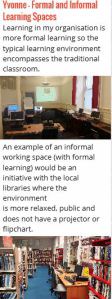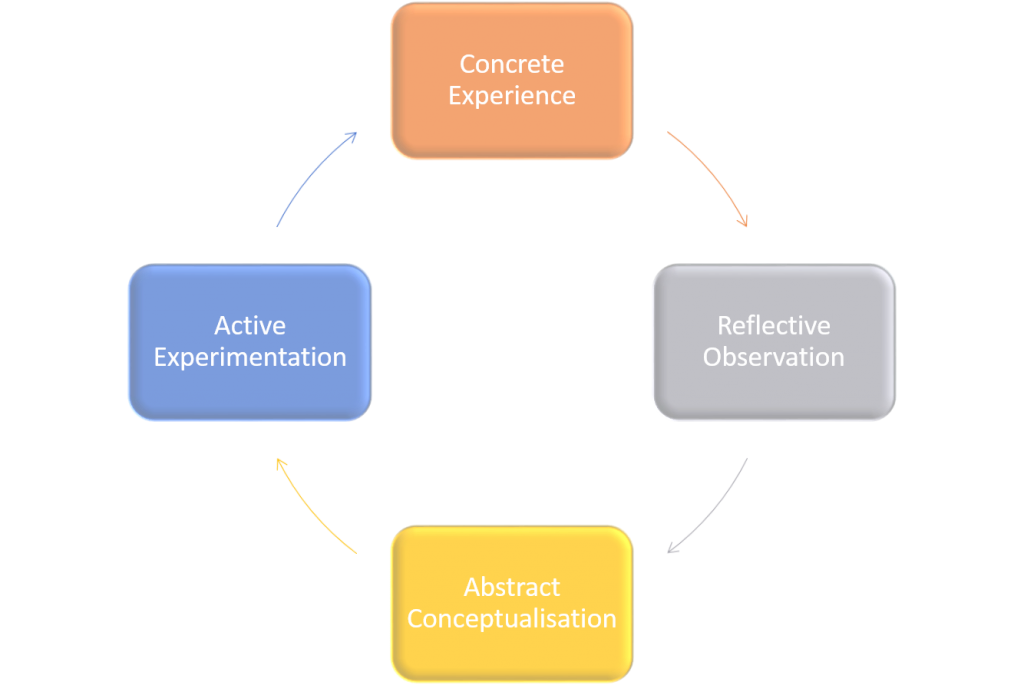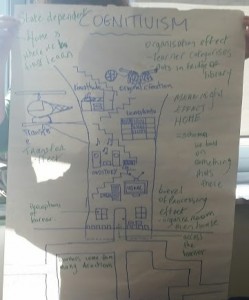The following is a reflection on Week 1 of the Learning Theories module using Gibbs Reflective Cycle. Homework for Week 1 is also included.
Description
The journey begins with our first lecture in Learning Theories. So what is Learning and what is Theory?
Learning can be defined as a change in behaviour (Birkenholz, 1999) or ‘learning is a relatively permanent change in human disposition or capability that is not ascribable simply to processes of growth’ (Gagné & Medsker, 1996, p.6). The latter views learning as a product with outcomes but David Kolb views it as ‘a process whereby knowledge is created through the transformation of experience’ (Edwards, Hanson & Thorpe, 1993, p.155).
Learning can be both formal and informal which relates to the exercise we were given prior to class where we were asked to upload photos of formal and informal learning. The environment I work in is a formal learning environment with the traditional classroom or behaviourist approach. However, I also carry out training in local libraries which requires a different approach and what I would consider to be more informal. Theories are suggested as ideas or practices.

My images
Feelings
I covered learning theories in Year 1 of my degree but we were exposed to many different theories today which I had never heard of, for example, conversation theory which is a cybernetic and dialectic framework where interactions lead to learning/knowing. I feel that I have a lot more to learn and look forward to delving in deeper.
Evaluation
During class my group was given the task of creating a poster to depict the key principles of cognitivism. This was a challenge initially but we pulled together as a team and created the image of a house (see below) which represented the brain encompassing elements such as schema, practice and transfer effects and advance organisers.
Furthermore, we discussed how we learn best and our preconceptions. I agree with the fact that we should cater for a range of diverse learners and I feel that eLearning provides resources that cater in many ways for the different types of learners.
Overall, these group exercises and discussions were very beneficial and the material was delivered in a very informative manner.
Analysis
On reflection, my teaching approach appears to be strong behaviourist and this is something I need to question further over the coming weeks. I am hoping that I may discover new theories that I can apply to my own practice to enhance my teaching.
Conclusion
The significance of this module is to create a solid foundation that can be applied to the designing and developing of eLearning resources. It is important that these tools are grounded in theory ensuring that a pedagogical to technology approach is taken.
Action Plan
It is important that I immerse myself in this new knowledge to gain new skills that will be applicable to my practice.
References:
Edwards, R., Hanson, A., & Thorpe, M. (2013). Culture and processes of adult learning. Routledge.
Gagné, R. M., & Medsker, K. (1996). The conditions of learning: Training applications. Harcourt Brace College Pub.
Homework
Write 2-3 paragraphs considering to what extent have the learning principles highlighted in class today been applied in your professional context? How have you experienced them?
All learning principles highlighted in class are applied in some shape or form to my professional practice which relates to adult education. From my experience many overlap and depending on the discipline some will be stronger than others. For example in practising a competency based skill the behaviourist theory is pertinent which involves practice and reinforcement. However, adult learners being self-directed will want to be able to investigate elements which then flows into the cognitive theory. Adult learning is problem-centered rather than content-oriented.
Furthermore, adult learners will come to class with past experiences and due to their autonomous nature will be willing to build on these (and hopefully willing to change existing schema). This resonates with the constructivism theory where structure is paramount with a facilitative approach. In going forward this insight into theory will allow me to apply the theory to practice to enhance the learning process for my learners. The implications for the theory for my practice is being able to match the correct theory to practice. The handout given out in class on holistic approach to technology enhanced learning illustrates the sheer volume of theories.
Experiential learning is also very relevant in my practice, in particular, the work of Kolb where learning begins with experience, reflection, conclusions and experimentation. The key aspects I am interested in are specific to andragogy and from researching some of the theories it is interesting to note that they are also relevant to eLearning.

